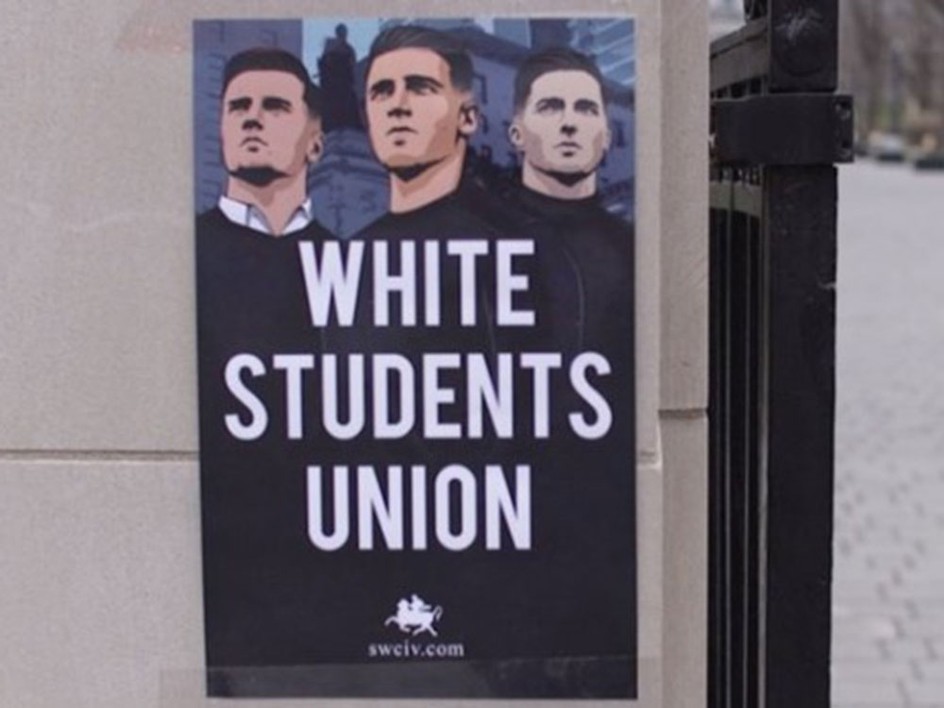The self-identified far-right group believes “white people are under attack”
The Students for Western Civilization, a self-identified far-right organization originating from Toronto that believes “white people are under attack,” is attempting to launch a branch called the “White Students Union” at McGill University.
George Hutcheson, the director and spokesperson for Students for Western Civilization, spoke to The Concordian about the group’s attempt to become an officially registered club at McGill University. He alleges that universities propagate the idea that “all white people are racist,” and feels that the organization is necessary.
According to Hutcheson, they have 20 active members in the Students for Western Civilization in Toronto and five founding members in the Montreal branch. He said that since hanging the posters at McGill, they have received several applications for the Montreal branch. They have not started the application process for the new candidates yet, he told The Concordian.
Hutcheson said he is more concerned about “skinheads” wanting to be a part of the “White Students Union” than undercover “Antifa.” Hutcheson considers “skinheads” to be “crazy people” who would misrepresent his organization.
“Since these ideas are so heavily oppressed, these people are attracted to them because they’re oppressed. They want to be associated with crazy ideas because they’re crazy. They want to get into trouble. That’s not what we are about,” he said.
Although he does consider his group to be far-right, he believes that his group’s distinction is that they are “mature and sincere.” He reinforces that idea by claiming his group is not meant to “troll” people.
He claims that the group is genuinely concerned about “anti-white hate speech,” and the implications of “mass immigration,” such as Europeans becoming minorities in western countries.
He makes a distinction between his group and the group “Proud Boys” by stating that “their vision is focused around culture. Whereas ours is more ethnic.”
“We’re concerned about how in our universities it is being propagated that all white people are racist, only white people can be racist, white fragility, white privilege — we feel that it is white people who are under attack. Therefore, it is logical and necessary for there to be a defense for that group who are under attack. The Proud Boys don’t use that kind of language,” he said.
Hutcheson explained that his concerns regarding “mass immigration” are that white people, as minorities, won’t have the political power to retain their sovereignty and autonomy. However, he did not acknowledge that what he fears is the same experience that minorities face in Canada today.
He used the recent United States election as an example, where he explained, “The majority of European Americans voted for the Republican Party like they always do. Every other ethnic group voted for the opposing party. So now European America is being ruled over someone they did not elect.”
Hutcheson’s assertion that every other ethnic group voted for the Democratic Party in the 2020 United States presidential election is incorrect — both African American and Latino American voters increased their support for Donald Trump since the 2016 election. According to The Atlantic, Donald Trump received approximately 32 per cent of the Latino vote in the 2020 election. This is an increase from 28 per cent in the 2016 election. According to the AP VoteCast survey, eight per cent of African Americans voted for President Trump in the 2020 election which, according to the Cooperative Congressional Election Study, was an increase of two percent from the 2016 election.
When asked why he named the club “White Students Union” as opposed to “European Students Union,” he explained that he uses the term white to “send a message that we won’t tolerate oppression or being controlled. We won’t tolerate being told what we can call ourselves.”
“If we want to call ourselves white then we are going to call ourselves white. You can’t tell us that we can’t call ourselves white or have a white student union. It’s a gesture of defiance. An explicit assertion of our identity,” said Hutcheson.
In the future he plans to transition his group from a purely academic group to a human rights activist group. He would like to start setting up conferences at McGill but said that it is extremely difficult given the circumstances surrounding COVID-19.
As of now, McGill University has not responded to their request to become an officially registered club. Will McGill issue a statement about a “White Students Union” on campus? In 2015, a Ryerson University’s Spokesperson stated that the “White Students Union” posters put up on their campus were offensive. It’s been five years, and now they are attempting to find like-minded followers in Montreal.
Photograph from Facebook
